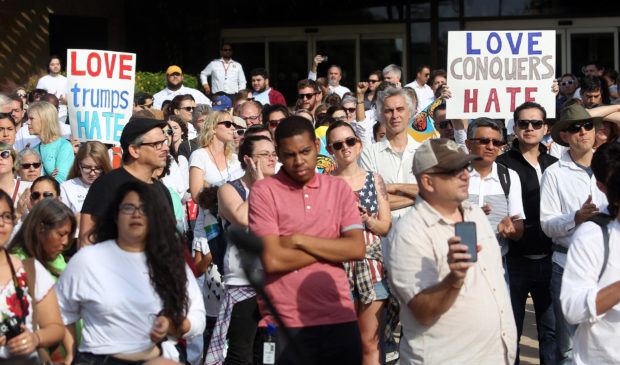Newsletter Signup
The Austin Monitor thanks its sponsors. Become one.
Most Popular Stories
- Austin opens new affordable housing development in Southeast Austin
- Landmark commission says goodbye to Nau’s Enfield Drug
- Congress Avenue transformation plan gets support from Urban Transportation Commission
- After a decline last year, Travis County homeowners should expect a return to rising property taxes
- Ethics complaints filed against Siegel, AURA
-
Discover News By District

Will Trump’s vow to cut funding for sanctuary cities affect Austin?
Thursday, January 12, 2017 by Audrey McGlinchy, KUT
In a windowless office in a Northwest Austin thrift store, past several racks of high-end used clothing, Todd Logan pored over a list of names.
“We had about 84 folks we were helping through our housing program,” he said. Logan is the director of client services at Project Transitions, a nonprofit that provides medical care and housing for people living with AIDS. He estimates that of the 84 people the group helped last year to keep or find housing, more than half were living on the streets.
All of the thrift store’s revenue goes to the nonprofit, but the organization also depends heavily on the slice of $1.1 million in federal Housing and Urban Development grants it gets through the city of Austin.
“If we didn’t receive the HOPWA funding, we would have to close our doors,” Logan said, referring to the Housing Opportunities for Persons with HIV/AIDS program.

Todd Logan is the director of client services for Project Transitions, a nonprofit serving people with AIDS.
That possibility is not so far-fetched. President-elect Donald Trump has said that in the first 100 days of his presidency, he’ll cancel all federal funding to sanctuary cities.
But what is a sanctuary city? City Council passed symbolic measures declaring the city immigrant-friendly and recently voted to begin subsidizing legal fees for immigrants. Other cities – like Philadelphia and San Francisco – have official policies instructing law enforcement to ignore warrantless requests to detain people over their immigration status.
According to Elissa Steglich, a professor at the University of Texas Immigration Clinic, there’s no formal definition of a sanctuary city. And without a formal definition, might Austin be considered one?
Austin received nearly $43 million in federal grants this past year. And, while that’s just about 1 percent of the city’s budget, it pays for things residents rely on, like the dogs that sniff luggage at the airport, residential lead abatement and rental assistance.
With so much potentially at risk, local leaders have kept the phrase “sanctuary city” out of their mouths.
A few days after the election, Mayor Steve Adler spoke to a crowd gathered outside City Hall to show support for immigrants. When a reporter asked whether Austin is a sanctuary city, he talked around the phrase, invoking former Austin Police Chief Art Acevedo.
“I think it’s important that Austin protect the residents who are here,” he said. “I am a real supporter of Chief Acevedo’s policy, which is to enforce laws but do it in a way that preserves the relationship between police and all communities so that everybody in our community feels safe.”
Photos by Jorge Sanhueza-Lyon/KUT. This story was produced as part of the Austin Monitor’s reporting partnership with KUT.
The Austin Monitor’s work is made possible by donations from the community. Though our reporting covers donors from time to time, we are careful to keep business and editorial efforts separate while maintaining transparency. A complete list of donors is available here, and our code of ethics is explained here.
You're a community leader
And we’re honored you look to us for serious, in-depth news. You know a strong community needs local and dedicated watchdog reporting. We’re here for you and that won’t change. Now will you take the powerful next step and support our nonprofit news organization?








